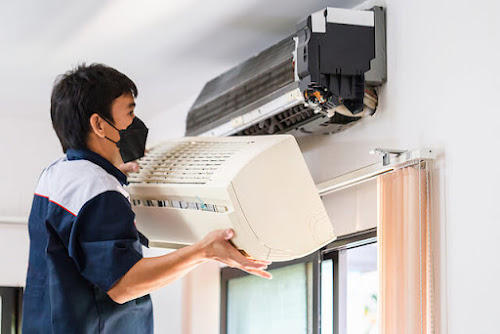How to fix common AC problems like a noisy unit or a leaking AC?
How to fix common AC
problems like a noisy unit or a leaking AC?
If you're experiencing common AC problems like a noisy unit
or a leaking AC, here are some steps you can take to address these issues:
Noisy Unit:
Check for loose
parts: Turn off the air conditioner and inspect the unit for any loose
components such as panels, screws, or fan blades. Tighten any loose parts to
see if it resolves the noise issue.
Clean or replace the
air filter: A clogged or dirty air filter can restrict airflow and cause
the system to work harder, resulting in increased noise. Replace the filter
according to the manufacturer's instructions.
Clear debris around
the unit: Ensure that the area around the outdoor unit is free from debris
like leaves, branches, or grass. Debris can obstruct airflow and lead to
unusual noises. Clear any obstructions to improve performance.
Lubricate moving
parts: If you hear squeaking or grinding sounds, it may indicate that
certain components require lubrication. Consult the manufacturer's guidelines
to identify which parts need lubrication and use the recommended lubricant.
If these steps don't resolve the noise issue, it's best to
contact a professional HVAC technician for a thorough inspection and repair.
Leaking AC:
Turn off the AC:
If you notice water leaking from your AC unit, the first step is to turn off
the system to prevent further damage.
Check the condensate
drain line: A clogged or disconnected condensate drain line can cause water
to back up and leak from the unit. Locate the drain line (usually a PVC pipe)
and check for any blockages. Use a wet-dry vacuum or a pipe cleaner to clear
any debris. Ensure that the drain line is properly connected and not damaged.
Clean the condensate
drain pan: The drain pan collects condensation from the unit. If it becomes
dirty or damaged, it can lead to leaks. Clean the drain pan using a mild
detergent and water solution. If the pan is damaged, consider replacing it.
Inspect the air
filter: A dirty or clogged air filter can obstruct airflow and cause ice to
form on the evaporator coil, leading to leaks.
Check for refrigerant
leaks: Low refrigerant levels can cause the evaporator coil to freeze and
eventually thaw, resulting in leaks. If you suspect a refrigerant leak, it's
essential to contact a professional HVAC technician as handling refrigerant
requires specialized knowledge and equipment.
If you've gone through these steps and the AC continues to
leak, it's best to seek professional air conditioner repair in Adelaide. An HVAC technician can diagnose the problem
accurately and perform any necessary repairs or maintenance to resolve the
issue.

Comments
Post a Comment